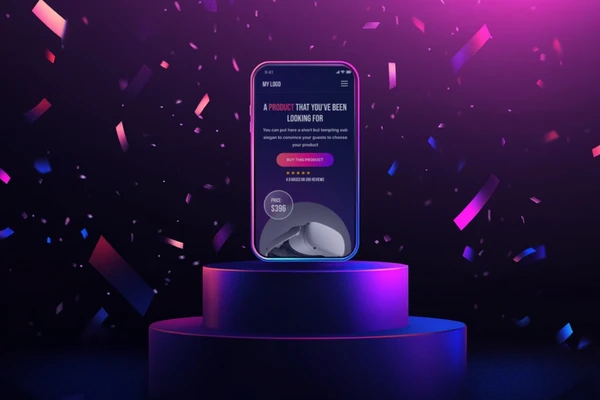Embarking on a blogging journey can be both exciting and challenging, but with the right strategies, you can turn your passion into a successful venture. Whether you're a business owner or an individual seeking to share your expertise, my top 21 tips for a successful blogging journey will guide you through the essential steps, from planning and content creation to monetization and growth. Follow these expert insights and unlock the potential of your blog to reach new heights of success!
Get Started!
Road to success through blogging
In today's digital age, having a successful blog is more important than ever for businesses and individuals. A well-crafted and engaging blog helps you establish credibility and authority in your niche and serves as an essential tool for connecting with your target audience and promoting your products or services.
With millions of blogs vying for attention, the competition can be fierce. That's why having the right strategies in place is crucial to ensure your blog stands out from the rest.
This article will guide you through the top 21 tips for blogging success. These tips help you create engaging, shareable content that resonates with your audience and drives traffic to your website. From planning and strategy to content creation and promotion, I've got you covered with the best practices that will set you on the path to becoming a successful blogger.
So, let's dive in and discover the secrets to making your blog a roaring success!
21 tips for a successful blog
1. Start from planning

A solid plan and strategy serve as the foundation for any successful blog. Without clear direction, it's easy to get lost in the endless sea of content online. In this section, I'll cover crucial steps to help you establish a strong strategy for your blog.
a) Determine to whom you are directing the message
Before you start writing, it's essential to know who you're writing for. Identifying your target audience allows you to tailor your content to their needs, interests, and preferences. To define your audience, ask yourself:
- Who would benefit most from your content?
- What are their demographics (age, gender, location, etc.)?
- What are their interests, pain points, and challenges?
To learn more about your audience, look at your site's statistics, for example, through Google Analytics. See who is watching your social media profiles or your competitors' profiles.
Once you have a clear picture of your target audience, you can create content that resonates with them and keeps them returning for more.
b) Get into your niche
Selecting a niche that aligns with your passions and expertise is crucial for long-term blogging success. A well-defined niche helps you stand out from the competition and positions you as an authority in your field. When choosing a niche, consider:
- Your areas of expertise and interests
- Market demand and competition
- Profitability and monetization potential
Check who is already operating in the niche you are considering. The stronger the competition, with a large customer base and years of experience, the harder it will be for you to break out.
Focusing on a specific niche will help you be better equipped to create targeted, valuable content that appeals to your audience and establishes you as a go-to resource.
c) Set ambitious but achievable goals
Establishing clear, measurable goals for your blog helps you stay focused and motivated as you work toward success. Your goals should be realistic and challenging, pushing you to grow and improve. Some common blogging goals include:
- Increasing website traffic
- Growing your email list
- Building a loyal following
- Generating revenue through advertising, affiliate marketing, or product sales
Make sure to track your progress regularly and adjust your goals as needed to stay on target.
d) Schedule all activities
A content calendar is an invaluable tool for staying organized and maintaining a consistent posting schedule. By planning your content in advance, you can ensure that you're covering a diverse range of topics that appeal to your target audience. To create a content calendar:
- Determine your posting frequency (e.g., once a week, twice a month)
- Brainstorm a list of potential blog post topics
- Assign deadlines for each post
- Use a digital or physical calendar to map out your content schedule
Remember - the plan is there to stick to it. Of course, in certain situations, you can make exceptions, but the more of them there are, the more difficult it will be for you to maintain regularity and get the kind of results you set at the very beginning.
2. Let your creativity flow

Creating high-quality content is the cornerstone of a successful blog. In this section, I'll explore essential tips for crafting engaging, informative, and share-worthy content that will keep your readers coming back for more.
a) Put quality in first place
While posting frequently can help you maintain visibility, it's crucial to prioritize the quality of your content. You can ensure the highest quality of your content by:
- Conducting keyword research ,
- Checking your competitors' content and adding to yours what they lack,
- Sharing your unique experience and knowledge,
- Adding extras to diversify the content - photos, infographics, videos, quizzes, etc.
High-quality content is more likely to be shared, earn backlinks, and improve search engine rankings, so don’t so don't regret your time polishing your content - if you do it right, the results can surpass your highest expectations.
b) Spice up your headlines
An attention-grabbing headline is essential for enticing readers to click on your blog post. Your headlines should be:
- Clear,
- Concise,
- Catchy,
- Enriched with keywords and power words ,
- Up to 580 pixels in length,
- Relevant to the content of the post.
The headline is one of the first things your potential audience sees in search results. So, you cannot underestimate the power of headlines in pulling traffic to your blog.
c) Make your content visible
Search engine optimization (SEO) is vital for driving organic traffic to your blog. SEO includes a lot of simple as well as no-cost activities that you can do entirely on your own like:
- Conducting keyword research to identify relevant search terms,
- Incorporating keywords naturally throughout your content,
- Using proper heading tags (H1, H2, H3) for better content structure,
- Add internal and external links to high-quality and relevant resources,
- Write descriptive alt tags for images.
These are just some of the SEO activities worth doing. Optimizing your content according to SEO best practices is an effective way to increase traffic to your blog.
d) Make your content shine again
Regularly updating your old content can help you stay relevant and improve your performance in search engine rankings. To update your content, consider:
- Add new information or resources,
- Update outdated facts or statistics,
- Repair broken links,
- Update the design or images.
Updating content can deliver faster results than posting completely new content. Also, for Google, constantly updated content is much more valuable than content that hasn't changed for several years.
3. Get support

To grow your blog's audience and reach, it's essential to actively promote your content and connect with others in your niche. In this section, I'll discuss practical strategies for promoting your blog and expanding your reach.
a) Expand your online presence
Social media platforms are powerful tools for sharing your content and connecting with your target audience. Harness its power by:
- Create profiles on relevant platforms, such as Facebook, Twitter, etc.
- Share your blog posts regularly,
- Interact with your followers by replying to comments and messages,
- Participate in conversations related to your niche.
The number of social media platforms you can use to promote yourself is huge. However, don't get caught up and focus only on those who are favored by your intended audience with your communications.
b) Create a trustworthy audience base
A mailing list is a valuable asset for any blogger, allowing you to connect with your audience and share your latest content directly. However, to use this method of promotion, you must first create an email list. You can do this by:
Publish newsletter subscription forms on the website,
Offer free material in exchange for an email,
Request an email address when using chat on the website.
Once you've built an already solid mailing list, get started:
- Proposer des contenus exclusifs,
- Soumettre du contenu nouvellement publié sur un blog,
- Demandez leur avis sur votre contenu.
Start now

c) Start creating a list of connections
Building relationships with other bloggers in your niche can lead to valuable partnerships, guest posting opportunities, and social media shares. Connect with other bloggers by:
By commenting on your posts,
Share your content,
Reach out to them via email or social media.
Collaborating with like-minded bloggers can help you expand your reach and grow your following.
d) Share your knowledge with others
Guest posting on other blogs can help you gain exposure, build backlinks, and establish credibility in your niche. To do it correctly:
- Look for blogs in your niche that accept guest posts,
- Send a well-crafted tone,
- Prepare high-quality articles that add value to your audience.
- Include a short author bio with a link to your blog.
It's a strategy that often requires a lot of time to get satisfactory results, but it's worth the effort.
e) Get involved
Joining online communities, such as forums, Facebook or Reddit groups, can help you connect with others who share your interests and promote your blog. Begin:
- take part in discussions,
- Share your experience,
- Offer helpful advice.
- Share links to your blog posts (if applicable).
By implementing these promotion and awareness strategies, you can effectively grow your blog audience, increase your online visibility, and position yourself as a trusted resource in your niche.
4. Start growing

Although blogging can be a rewarding activity on its own, many bloggers also aim to generate income through their efforts. In this section, I will discuss strategies to monetize your blog and encourage its growth.
a) Be prepared for all eventualities
Relying on just one source of income can be risky, so it's important to diversify your sources of income to ensure stability and continued growth. Some typical income sources for bloggers include:
- Advertising (e.g. Google AdSense, sponsored posts),
- affiliate marketing,
- Sell digital products (e.g. e-books, courses),
- Offer premium content or services (e.g. subscriptions, consulting),
- Collaboration with brands and sponsors.
Of course, do not exceed the amount either. It will be difficult for you to control them. Decide on a few first, where you see the greatest possibilities, and then you can move on to others.
b) Offer something special
Creating premium content or services is an effective way to monetize your blog and add value for your audience. Some options include:
- Memberships or subscriptions for exclusive content,
- Online courses or workshops,
- Consulting or coaching services,
- Digital products, such as e-books, templates or guides.
To be successful, make sure your premium offers align with the needs and interests of your audience and provide genuine value.
c) Join forces
Partnering with brands or sponsors can help you monetize your blog while introducing your audience to relevant products or services. Collaborations can take many forms, including:
- sponsored posts,
- product reviews,
- Affiliate Associations.
When working with brands, choose those that align with your niche and values, and always disclose your relationships to your audience.
5. Keep everything under control

To ensure your blog's continued success, monitoring its performance, using data to inform your decisions, and continuously optimizing your content is essential. In this section, I'll discuss three key strategies for leveraging analytics to improve your blog's performance and effectiveness.
a) Stay up to date
Regularly tracking your blog's performance can help you identify areas for improvement and measure the success of your strategies. Some key metrics to monitor include:
Traffic - measure the number of visitors to your blog and individual posts,
Engagement - analyze metrics such as average time on page, bounce rate, and comments to gauge audience interest and interaction,
Social shares - track the number of times your content is shared on social media platforms,
Conversion rates - measure the percentage of visitors who take desired actions, such as subscribing to your email list or purchasing a product.
It is a good idea to use tools such as Google Analytics, Ahrefs, Brand24, etc., to measure the success of your blog.
Start now

b) Make informed decisions
Data-driven decision-making is crucial for optimizing your blog's performance and achieving your goals. Use analytics data to:
- Identify popular topics and formats - analyze which posts receive the most traffic, engagement, and shares, and use this information to inform your content strategy.
- Optimize your posting schedule - determine the best days and times to publish new content based on your audience's engagement patterns.
- Improve your content's SEO - analyze search engine rankings and user behavior data to identify opportunities for optimizing your content and boosting its visibility.
- Refine your promotional efforts - measure the effectiveness of your marketing strategies and adjust your approach to maximize your reach and engagement.
Each decision supported by actual results will increase your chances of improving performance from the adjustments made.
6. Make blogging a part of your life

To achieve success in the world of blogging, it's essential to remain consistent and motivated throughout your journey. In this section, I'll discuss strategies for staying focused and maintaining momentum as you build and grow your blog.
a) Invest your time in blogging
Blogging can be time-consuming, and allocating dedicated time for content creation, promotion, and engagement is essential.
Create a blogging routine by setting aside regular blocks of time for planning, writing, editing, and promoting your content.
This will help you stay organized, maintain focus, and ensure that you're consistently producing high-quality content.
b) Acquire knowledge
Remaining informed about the latest trends, news, and best practices in your niche is essential for maintaining relevance and providing value to your audience. Regularly:
- Read industry publications,
- Attend conferences or webinars,
- Engage with other experts in your field.
This will not only help you stay informed but also provide you with inspiration and ideas for new content.
c) Connect with your audience
Engaging with your audience can be a powerful motivator, as it allows you to see the impact of your work and gain valuable feedback
- Respond to comments,
- Answer questions,
- Participate in relevant online communities to build relationships with your readers.
Remember that you are creating content first and foremost for your audience - so don't lose touch with them and let them take an active role in deciding on the materials you create.
Becoming a successful blogger - summary

In this article, I've provided you with 21 tips to help you on your journey towards successful blogging. From planning and strategy to monetization and growth, these tips cover a wide range of aspects crucial to building a successful blog. Let's recap the key areas we discussed:
- Planning and Strategy: Define your target audience, choose the right niche, set goals, and create a content calendar.
- Content Creation: Focus on quality, write engaging posts, use strong headlines, optimize for SEO, utilize visuals and update old content.
- Promotion and Outreach: Leverage social media, build an email list, network with other bloggers, and guest post on relevant sites.
- Monetization and Growth: Diversify your income streams, offer premium content and services, collaborate with brands, and use affiliate marketing.
- Analytics and Improvement: Monitor your blog's performance, use data to make informed decisions, and continuously improve your content.
- Staying Consistent and Motivated: Maintain a regular posting schedule, set aside time for blogging, stay updated on industry trends, and connect with your audience.
By following these tips and consistently working to improve your blog, you'll be well on your way to achieving long-term success in the blogging world. Remember, becoming a successful blogger takes time, dedication, and perseverance. Keep learning, adapting, and growing, and you'll be well on your way to making your blogging dreams a reality.
Get Started!
Successful blog - FAQ
How do bloggers become successful?
Bloggers become successful by consistently creating high-quality content, building an engaged community, and effectively monetizing their blog.
How much do successful bloggers make?
The income of successful bloggers can vary widely, but many make a full-time income or more from their blog through various monetization methods such as ads, sponsored content, affiliate marketing, and selling products or services.
What is a realistic blogging income?
A realistic blogging income depends on various factors such as niche, traffic, and monetization strategies. However, bloggers can make a few hundred to a few thousand dollars per month with consistent effort and effective monetization strategies. The average income for bloggers is $45,000.
What type of blog pays the most?
The type of blog that pays the most depends on the niche, audience, and monetization strategies. Some of the most profitable niches include finance, health&wellness, technology, travel, and food.
How do beginner blogs make money?
Beginner blogs can make money through various monetization strategies such as ads, affiliate marketing, sponsored content, and selling digital products or services.
Why do bloggers fail to make money?
Bloggers may fail to make money due to a lack of traffic, poor monetization strategies, low-quality content, and a lack of consistency.
What should I avoid in blogging?
It's important to avoid plagiarism, over-promoting products or services, neglecting SEO, and failing to engage with your audience.
How often should you blog to be successful?
The frequency of blogging depends on various factors such as niche and audience, but bloggers should aim to consistently create high-quality content and engage with their audience. A regular publishing schedule, such as once or twice a week, is a good place to start.

Karol is a serial entrepreneur, e-commerce speaker m.in for the World Bank, and founder of 3 startups, as part of which he has advised several hundred companies. He was also responsible for projects of the largest financial institutions in Europe, with the smallest project being worth over €50 million.
He has two master's degrees, one in Computer Science and the other in Marketing Management, obtained during his studies in Poland and Portugal. He gained experience in Silicon Valley and while running companies in many countries, including Poland, Portugal, the United States, and Great Britain. For over ten years, he has been helping startups, financial institutions, small and medium-sized enterprises to improve their functioning through digitization.




x600.webp)



